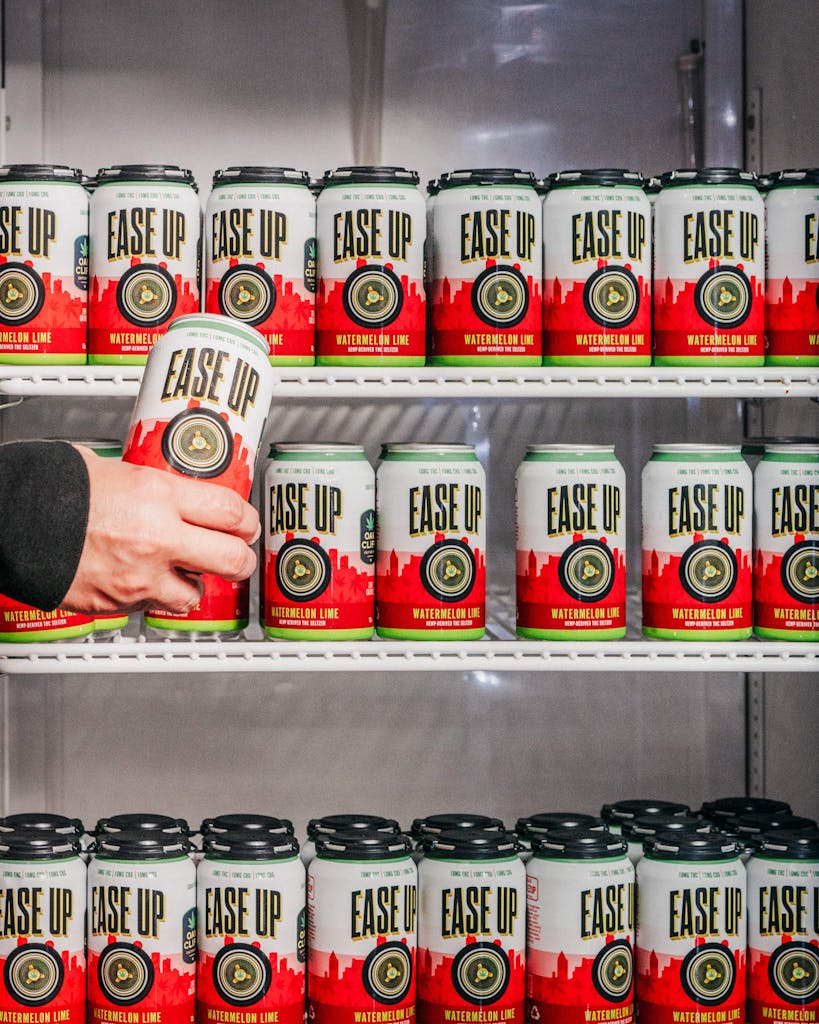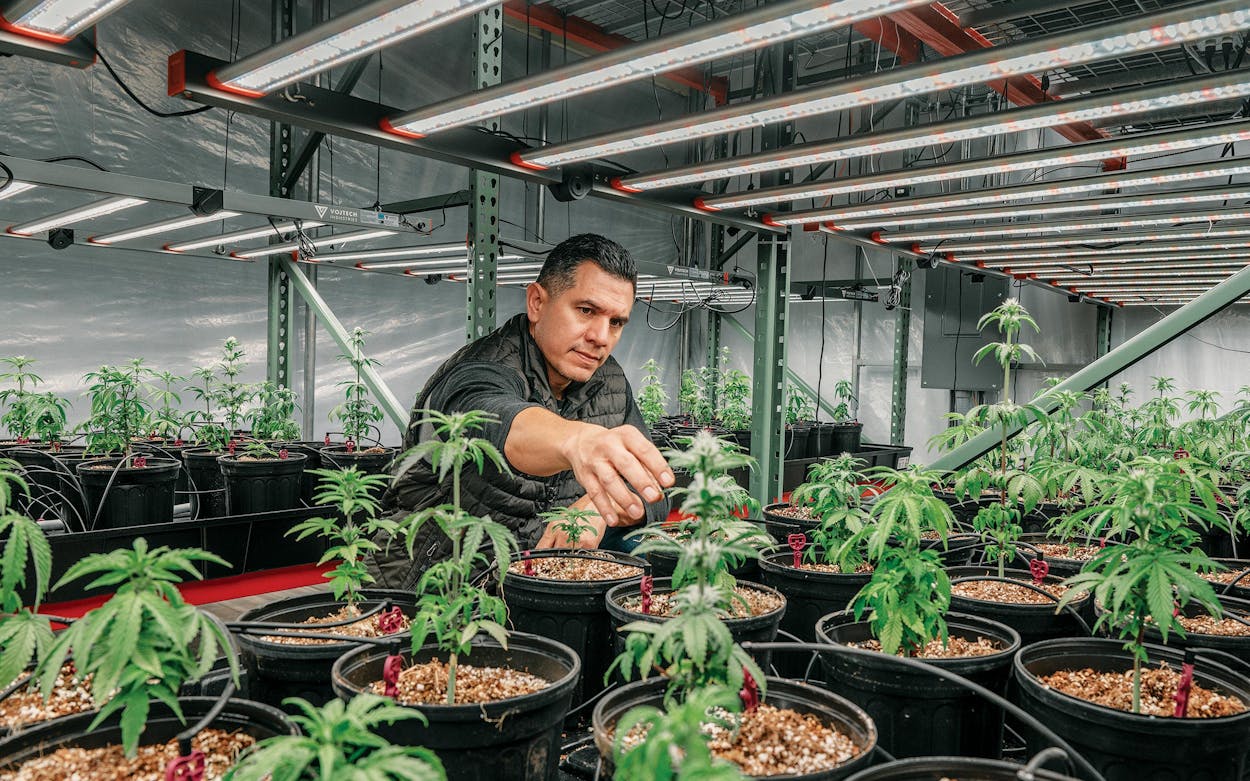Eddie Velez, who is 44, legally grows hemp in North Texas and sells CBD products through his Dallas store, Oak Cliff Cultivators.
Cannabis has always been part of my life. When I was growing up, my dad was a dealer. He was distributing marijuana, and that’s how we paid the bills. He got put into prison for all that type of stuff, and it kind of destroyed my family. My parents got divorced. My mom raised two boys in Oak Cliff, among all the gang activity going on. We lived on welfare for a little bit until she got back on her feet. She really kept it together, you know, during the time my dad was in prison.
I graduated from high school and went into the Marine Corps. I was with a unit called the Second FAST Company. That stands for Fleet Antiterrorism Security Team. When I got out, I took my GI Bill benefits and went to the University of North Texas—got a degree in emergency management. I worked for FEMA, the Federal Emergency Management Agency, for a while. Hurricane Harvey was my last deployment. And after that I kind of realized, all right, it’s time for me to change my career.
When I saw the hemp law was changing in Texas, in 2019, it caught my attention. I’ve always been a connoisseur of the plant. Here was an opportunity for me to get really engaged in it as a producer. My wife, Martha, wasn’t against cannabis, but she wasn’t for cannabis. The kind of environment where we grew up, people smoked weed. People got into trouble. People went to jail. So she saw the negative. But she was having some health issues, and we went into the CBD [cannabidiol] world, and it kind of opened her eyes about the benefits of cannabis. It helped her change her life, changed my life, and allowed us both to go through this path into the industry. We started our business with our retirement money.

I had never grown a thing in my life, could never keep nothing alive, but I felt like I could do this. I worked a deal with my family. We have a farm in Brownwood, and we talked them into allowing me to build greenhouses. The first harvest was in October 2020. It was an exciting moment. After everything we went through, here we are, cutting down the plant and actually being open with it. Actually taking this to market and sharing what this plant can do. I had my mother and my father there when we cut down the first plant. Man, it felt like redemption, you know?
I wanted to grow a whole bunch of hemp and sell it wholesale to different retailers. But I quickly found out that you can’t survive as a hemp farmer in Texas just selling whole pounds to retail stores. The return on investment wasn’t there, not on our scale. You really have to go out into the community and engage with consumers and tell them about your product, tell them your story. And that’s exactly what we did. We were doing pop-up events where we would set up a tent, take a table out there, put tablecloths down, and put our product on the table. We did that for about a year before we got our retail space.
Last year we opened a store in Oak Cliff. People come in for different things. They’re stressed out. They’re getting exhausted. They can’t sleep. The first thing they ask is, “What’s the difference between CBD and marijuana?” And I explain you got two lanes: you got marijuana and you got hemp. Anything below 0.3 percent THC [tetrahydrocannabinol] is legal, and anything above that level is considered marijuana. The plants look the same. They smell the same. But when you smoke marijuana, you smoke weed, you’re in the cloud—you got that sensation of being head high. With CBD products, it’s more of a body sensation.

Now we have an indoor grow facility in Sherman. It’s about an hour and a half drive from Oak Cliff. We have about 240 plants growing there right now. Every day we do our checks, making sure our plants are looking good, making sure they’re fed, making sure they’re trimmed, watching out for bugs, ensuring the environmental conditions are ideal. I have a daily checklist for everything, including the temperature, the CO2 level, the humidity, the amount of water they’re getting, and the amount of nutrients they’re getting.
Currently in the state of Texas, you can grow the hemp flower and sell it. However, we cannot turn our flower into a smokable preroll. Texas has this ban on companies manufacturing those. So I have to send it to Oklahoma City, where they make the smokable prerolls, and they send it back to me. It’s a pain for us because it’s an additional cost and it makes no sense.
Our number one seller is going to be our mango Tajín gummies. If you ever had Tajín, you know what Tajín is. It’s that Mexican seasoning you put on your fruit or over your beer. We grew up eating Tajín. Everything we had, we put Tajín on it. So we wanted to show people, hey, this is how we grew up. We want to share our experiences with you.
We have two governing authorities that oversee hemp in Texas. Once you’re ready to harvest, the state comes out and they do an official test on your crop to make sure it is below 0.3 percent THC. Once they approve that, then you’re allowed to harvest your product. I’ve lost a crop to testing. And I’ve lost a crop to weather. I think it’s one of the things you have to go through to grow—not grow literally, but kind of grow and mature in this industry.
I think Texas will be one of the last states to get on board with legalization. However, when it does get on board, Texas is going to be a leading state for marijuana. You already have organizations coming into Texas, buying land, and preparing for when it becomes legal. Our hope is that when it does, we can reflect back and say all this time and effort that we put in since 2019 was worth the effort. It was worth quitting our jobs. It was worth the sweat and time and waking up in the middle of the night with nightmares about “Oh man, I invested all my money into this thing,” you know? I’m hoping it will all pay off in the future. To get into medical marijuana and get into recreational marijuana, that’s the long-term goal. That’s where we feel we can really start turning a profit.
This article originally appeared in the January 2024 issue of Texas Monthly with the headline “Eddie Velez, Cannabis Farmer.” Subscribe today.
- More About:
- Working Life
- Dallas









